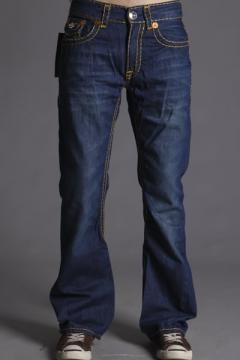
It is an enduring mystery to anyone reared on $50 Levi's: How can a pair of jeans cost as much as the Phantom, the new look from True Religion
Outlet that will be priced as high as $375?
The answer can be found here in Los Angeles, in the global capital of so-called premium denimone of the few areas of fashion that remains largely American-made. An industrial zone here near the city's center is home to
True Religion Outlet , J Brand, Seven For All Mankind and other pricey denim brands that have elevated what was once workman's togs to a luxury industry all its own.
This is a rarefied segment of the denim business. Americans bought $13.8 billion of men's jeans and women's jeans in the year ended April 30, according to market-research firm NPD Group. But only about 1% of jeans sold in the U.S. over that year cost more than $50.
The prices of "premium" jeansindustry jargon for luxury-priced denimappear to be edging slightly upward after a downturn following the financial crisis. Right now, J Brand's Maria women's jeans can sell for $226. Men's Aidan jeans from Seven For All Mankind cost $225. Prices for Gucci jeans range from $495 to $665. Premium jeans are made in the U.S., which is a big part of their allure.
Gloria Vanderbilt and Calvin Klein introduced the world to so-called designer jeans decades ago, and what began as a relatively small trend endured. Jeans are worn everywhere from the office to the opera these days. But there is a less-than-subtle caste system for denim: A pair of "Sevens," as some call jeans from Seven For All Mankind, conveys a statement about one's fashion savoir faire (and income) that less expensive brands don't.
It costs about $50 to make a pair of Super T jeans, True Religion's best-selling style with oversized white stitching, estimates founder, chairman and chief executive, Jeff Lubell. The wholesale price is $152, he says, and the average retail price is $335. Of course, plenty of these jeans sell at substantially less than full price.
The Phantom was first shown to retailers in January, and True
Religion is building its fall marketing campaign around the jean. With less prominent logos and detailing, it resonates with the current antilogo trend in fashion, but its details are designed to appeal to real "jeaners," as Mr. Lubell refers to premium-denim lovers. It has a small American flag hand-embroidered on the waistband. A subtle logo on the pocket is like a ghost, or phantom, of the brassy original logo.